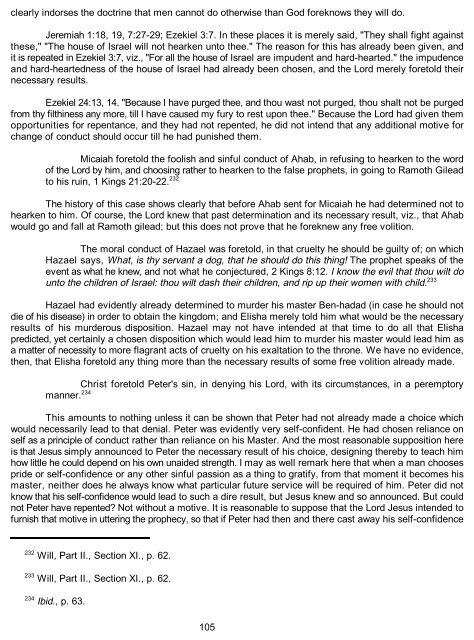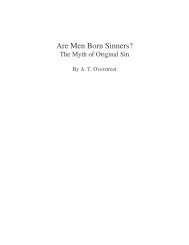Foreknowledge by Joel Hayes - Library of Theology
Foreknowledge by Joel Hayes - Library of Theology
Foreknowledge by Joel Hayes - Library of Theology
You also want an ePaper? Increase the reach of your titles
YUMPU automatically turns print PDFs into web optimized ePapers that Google loves.
clearly indorses the doctrine that men cannot do otherwise than God foreknows they will do.<br />
Jeremiah 1:18, 19, 7:27-29; Ezekiel 3:7. In these places it is merely said, "They shall fight against<br />
these," "The house <strong>of</strong> Israel will not hearken unto thee." The reason for this has already been given, and<br />
it is repeated in Ezekiel 3:7, viz., "For all the house <strong>of</strong> Israel are impudent and hard-hearted." the impudence<br />
and hard-heartedness <strong>of</strong> the house <strong>of</strong> Israel had already been chosen, and the Lord merely foretold their<br />
necessary results.<br />
Ezekiel 24:13, 14. "Because I have purged thee, and thou wast not purged, thou shalt not be purged<br />
from thy filthiness any more, till I have caused my fury to rest upon thee." Because the Lord had given them<br />
opportunities for repentance, and they had not repented, he did not intend that any additional motive for<br />
change <strong>of</strong> conduct should occur till he had punished them.<br />
232<br />
Will, Part II., Section XI., p. 62.<br />
233<br />
234<br />
Micaiah foretold the foolish and sinful conduct <strong>of</strong> Ahab, in refusing to hearken to the word<br />
<strong>of</strong> the Lord <strong>by</strong> him, and choosing rather to hearken to the false prophets, in going to Ramoth Gilead<br />
to his ruin, 1 Kings 21:20-22. 232<br />
The history <strong>of</strong> this case shows clearly that before Ahab sent for Micaiah he had determined not to<br />
hearken to him. Of course, the Lord knew that past determination and its necessary result, viz., that Ahab<br />
would go and fall at Ramoth gilead; but this does not prove that he foreknew any free volition.<br />
The moral conduct <strong>of</strong> Hazael was foretold, in that cruelty he should be guilty <strong>of</strong>; on which<br />
Hazael says, What, is thy servant a dog, that he should do this thing! The prophet speaks <strong>of</strong> the<br />
event as what he knew, and not what he conjectured, 2 Kings 8:12. I know the evil that thou wilt do<br />
unto the children <strong>of</strong> Israel: thou wilt dash their children, and rip up their women with child. 233<br />
Hazael had evidently already determined to murder his master Ben-hadad (in case he should not<br />
die <strong>of</strong> his disease) in order to obtain the kingdom; and Elisha merely told him what would be the necessary<br />
results <strong>of</strong> his murderous disposition. Hazael may not have intended at that time to do all that Elisha<br />
predicted, yet certainly a chosen disposition which would lead him to murder his master would lead him as<br />
a matter <strong>of</strong> necessity to more flagrant acts <strong>of</strong> cruelty on his exaltation to the throne. We have no evidence,<br />
then, that Elisha foretold any thing more than the necessary results <strong>of</strong> some free volition already made.<br />
Christ foretold Peter's sin, in denying his Lord, with its circumstances, in a peremptory<br />
manner. 234<br />
This amounts to nothing unless it can be shown that Peter had not already made a choice which<br />
would necessarily lead to that denial. Peter was evidently very self-confident. He had chosen reliance on<br />
self as a principle <strong>of</strong> conduct rather than reliance on his Master. And the most reasonable supposition here<br />
is that Jesus simply announced to Peter the necessary result <strong>of</strong> his choice, designing there<strong>by</strong> to teach him<br />
how little he could depend on his own unaided strength. I may as well remark here that when a man chooses<br />
pride or self-confidence or any other sinful passion as a thing to gratify, from that moment it becomes his<br />
master, neither does he always know what particular future service will be required <strong>of</strong> him. Peter did not<br />
know that his self-confidence would lead to such a dire result, but Jesus knew and so announced. But could<br />
not Peter have repented? Not without a motive. It is reasonable to suppose that the Lord Jesus intended to<br />
furnish that motive in uttering the prophecy, so that if Peter had then and there cast away his self-confidence<br />
Will, Part II., Section XI., p. 62.<br />
Ibid., p. 63.<br />
105






